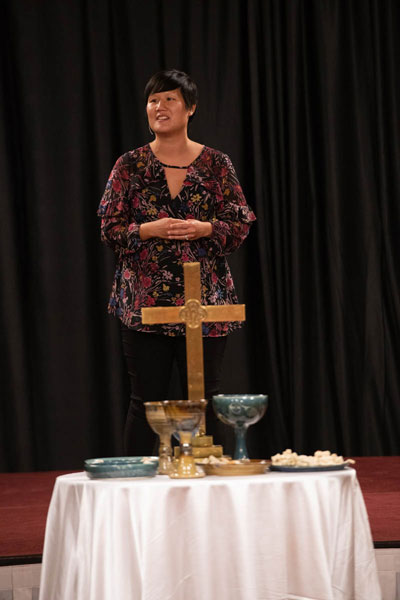
Larissa Kwong Abazia says that January lectionary readings speak to Presbyerians about discipleship.
January is often a month of recovery from the preceding seasons of Advent and Christmas and the calm before the upcoming seasons of Lent and Easter. Many churches find themselves with settled budgets for the new year and rarely bear in mind the role of stewardship in worship. Though counterintuitive, I encourage us to consider that this month’s lectionary readings provide ample opportunities to explore discipleship and the faithful discernment of the use of possessions.
Walter Brueggemann said, “…we must confess that the central problem of our lives is that we are torn apart by the conflict between our attraction to the good news of God’s abundance and the power of our belief in scarcity — a belief that makes us greedy, mean and unneighborly. We spend our lives trying to sort out that ambiguity.” (“The Liturgy of Abundance, the Myth of Scarcity,” Christian Century, March 24-31, 1999). We should be entering the season of Epiphany with this intention, digging deep into the good news that extends north and south, east and west, to all corners of the world as humanity is empowered by the Holy Spirit’s wild abandon.
Unfortunately, God’s gift is too often met with attempts to define, limit, and box in the abundance of holy love to the world:
- What must one do to be a part of the community, to be a member?
- What are the marks of a person of faith?
- Taking all of these things into account, who’s in and who’s out?
We would do well to remember the outsider status of the magi who visit the young family, are transformed by their experience with the holy child, and leave by another way to thwart King Herod’s political intentions. The following Sunday’s celebration of the baptism of Christ illustrates our own death to the things of this world as we pass through the same waters. In both instances, God’s freely given gift is meant to instill generosity and gratitude, inspired to share what we have with others who are valued equally by the Triune God.
This struggle is very similar to the early Christian community in Corinth in the passages for the last two Sundays in January. Paul writes that there is neither a hierarchy of gifts given by the Spirit nor a value-based economy founded in individual production. The busyness, economic demands, and measurements of difference of the surrounding social context is not valued or upheld in the church. Competition has no place in Christian community!
Believers are encouraged to see themselves as a unified body in which everyone contributes as they are truly and fully created. In this embodied community, every single person has value and purpose. In fact, in order for the whole to thrive, individuals must participate in a common life together. We are simply not complete without one another. It would be easy to make this an idealistic fantasy, but Paul meant for it to be a lived reality. In spite of human perceptions of differences, power, authority, and access to resources, everyone would be cared for because of their membership to the whole.
There is no shortness of ways that the world will tell us that scarcity is the truth: we need to work more, earn more, produce more, and invest more all while sleeping less, participating less in the lives of others, and ignoring the radical transformation offered by Sabbath-keeping. We are encouraged to fear those who are different, grasping onto our own power, privilege, and security with clenched fists rather than opening our hands toward the hungry, thirsty, stranger, naked, or prisoner among us. (Matthew 25: 37-40) The most vulnerable are exposed because of our refusal to see them as valued parts of the body as well.
We cannot be called as disciples in the world while remaining possessed by our earthly possessions. A life of faith demands we acknowledge that God first created our hands and feet, our whole being. We would do well to spend our lives dedicating our whole selves and beings to the glory of God.
The Rev. Larissa Kwong Abazia is an ordained pastor in the Presbyterian Church (U.S.A.). She earned her undergraduate degree at Rutgers University and M.Div. at Princeton Theological Seminary. Her ministry started with a pastoral residency program at Thomas Jefferson University Hospital in Philadelphia. It was there that she learned and practiced the importance of active listening and reflection during moments of trauma and transition. She then moved to Chicago to serve a congregation three blocks from Wrigley Field. Her main responsibilities included overseeing a Friday evening program for at risk LGBTQ youth and the young adult ministries of the church. Larissa has since served congregations in New Jersey and Queens, N.Y. She has also served as the Director of Church Relations at Princeton Theological Seminary.
Throughout her life and career, she has been dedicated to racial and gender justice and is interested in the ways that the intersections of all parts of one’s identity can be embraced as strengths. This work brought her to denominational leadership, including serving as the Vice-Moderator to the 221st General Assembly, where she was able to challenge the current structures and assumptions of life together. Kwong Abazia is a regular speaker and preacher throughout the denomination.
Her piece is republished with permission from the Stewardship Ministry blog at the Presbyterian Foundation.
